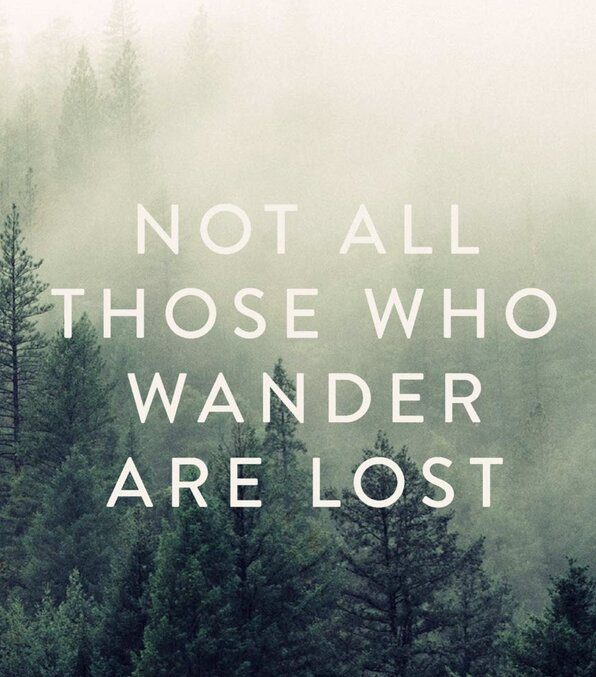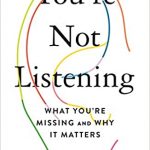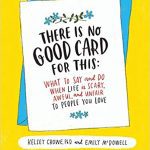“All that is gold does not glitter, Not all those who wander are lost; The old that is strong does not wither, Deep roots are not reached by the frost. From the ashes a fire shall be woken, A light from the shadows shall spring; Renewed shall be blade that was broken, The crownless again shall be king.” – J.R.R. Tolkien, The Fellowship of the Ring
You are not supposed to have figured everything out; your path is made by walking it, take it a step at a time. Most times, we don’t see the light at the end of the tunnel, you just need to trust the process. It does not matter where you start. What matters is where you are going. It is ok to have stopgap jobs for a while; it is ok not to know what you want to do next after college, it is ok not to be married yet at 35, it is ok not to be a parent at 40, it is ok to wander for a while, it is ok not to be ok. The key is to be patient and enjoy the journey with the ups and downs. As American Journalist Hal Borland once said, “Knowing trees, I understand the meaning of patience. Knowing grass, I can appreciate persistence.”
“Knowing trees, I understand the meaning of patience. Knowing grass, I can appreciate persistence.”
The pressure can be overwhelming from your parent(s), peers, social media, and yourself, but you have to trust the process and be gentle with yourself. When you are young, you have the luxury of trying many things to figure out what you are good at; the greats have all taken that path. They take risks; they follow their bliss, they have faith in themselves, they take a gap year, they take a sabbatical, they tune out the noise, they left their comfort zone.
In his very inspiring 2005 Stanford University Commencement Speech, Former Apple CEO, Steve Jobs spoke about the value of connecting the dot and wandering:
And 17 years later I did go to college. But I naively chose a college that was almost as expensive as Stanford, and all of my working-class parents’ savings were being spent on my college tuition. After six months, I couldn’t see the value in it. I had no idea what I wanted to do with my life and no idea how college was going to help me figure it out. And here I was spending all of the money my parents had saved their entire life. So I decided to drop out and trust that it would all work out OK. It was pretty scary at the time, but looking back it was one of the best decisions I ever made. The minute I dropped out I could stop taking the required classes that didn’t interest me, and begin dropping in on the ones that looked interesting.
It wasn’t all romantic. I didn’t have a dorm room, so I slept on the floor in friends’ rooms, I returned Coke bottles for the 5¢ deposits to buy food with, and I would walk the 7 miles across town every Sunday night to get one good meal a week at the Hare Krishna temple.
I loved it. And much of what I stumbled into by following my curiosity and intuition turned out to be priceless later on.
what I stumbled into by following my curiosity and intuition turned out to be priceless later on.
Let me give you one example:
Reed College at that time offered perhaps the best calligraphy instruction in the country. Throughout the campus every poster, every label on every drawer, was beautifully hand calligraphed. Because I had dropped out and didn’t have to take the normal classes, I decided to take a calligraphy class to learn how to do this. I learned about serif and sans serif typefaces, about varying the amount of space between different letter combinations, about what makes great typography great. It was beautiful, historical, artistically subtle in a way that science can’t capture, and I found it fascinating.
None of this had even a hope of any practical application in my life. But 10 years later, when we were designing the first Macintosh computer, it all came back to me. And we designed it all into the Mac. It was the first computer with beautiful typography. If I had never dropped in on that single course in college, the Mac would have never had multiple typefaces or proportionally spaced fonts. And since Windows just copied the Mac, it’s likely that no personal computer would have them. If I had never dropped out, I would have never dropped in on this calligraphy class, and personal computers might not have the wonderful typography that they do. Of course it was impossible to connect the dots looking forward when I was in college. But it was very, very clear looking backward 10 years later.
Again, you can’t connect the dots looking forward; you can only connect them looking backward. So you have to trust that the dots will somehow connect in your future. You have to trust in something — your gut, destiny, life, karma, whatever. This approach has never let me down, and it has made all the difference in my life.
In his book, Invent and Wander: The Collected Writings of Jeff Bezos, Amazon CEO writes about the power of wandering:
“I believe in the power of wandering. All my best decisions in business and in life have been made with heart, intuition, and guts, not analysis. When you can make a decision with analysis, you should do so, but it turns out in life that your most important decisions are always made with instinct, intuition, taste, and heart.”
In his 2011 University of Pennsylvania Commencement Speech, Academy Award-winning Actor Denzel Washington shared some great insights with the graduating students about the power of wandering and falling forward:
Some of you are business majors. Some of you are theologians, nurses, sociologists. Some of you have money. Some of you have patience. Some have kindness. Some have love. Some of you have the gift of long-suffering.
Whatever it is… what are you going to do with what you have?
Sometimes it’s the best way to figure out where you’re going. Your life will never be a straight path.
I began at Fordham University as a pre-med student. That lasted until I took a course called “Cardiac Morphogenesis.”
I couldn’t pronounce it… and I couldn’t pass it.
Then I decided to go pre-law. Then journalism.
With no academic focus, my grades took off in their own direction: down.
My GPA was 1.8 one semester, and the university very politely suggested it might be better to take some time off.
I was 20 years old, at my lowest point.
And then one day—and I remember the exact day: March 27th, 1975—I was helping out in the beauty shop my mother owned in Mount Vernon. An older woman who belonged to my mother’s church, one of the elders of the town, was in there getting her hair done and kept giving me these strange looks.
She finally took the drier off her head and said something to me I’ll never forget:
“Young boy,” she said. “I have a spiritual prophecy: you are going to travel the world and speak to millions of people.”
Like a wise-ass, I’m thinking to myself: “Does she got anything in that crystal ball about me getting back to college in the fall?”
But maybe she was on to something. Because later that summer, while working as a counselor at a YMCA camp in Connecticut, we put on a talent show for the campers.
After the show, another counselor came up to me and asked: “Have you ever thought of acting? You should. You’re good at that.”
When I got back to Fordham that fall I changed my major once again —for the last time.
And in the years that followed—just as that woman getting her hair done predicted—I have traveled the world and I have spoken to millions of people through my movies.
Millions who—up ‘till today—I couldn’t see while I was talking to them.
“It is better to be prepared for an opportunity and not have one than to have an opportunity and not be prepared.” Whitney M. Young, Jr.
Life is not a linear path; you have to strive to become a better version of yourself continuously. You are either repairing or preparing, cos when the opportunity comes; there would not be time to prepare. To figure it out, finding your passion may require you to try a lot of things, and that might require you to wander for a while; remember: “Not all those who wander are lost.”
All the best in your quest to get better. Don’t Settle: Live with Passion.



Comments are closed.